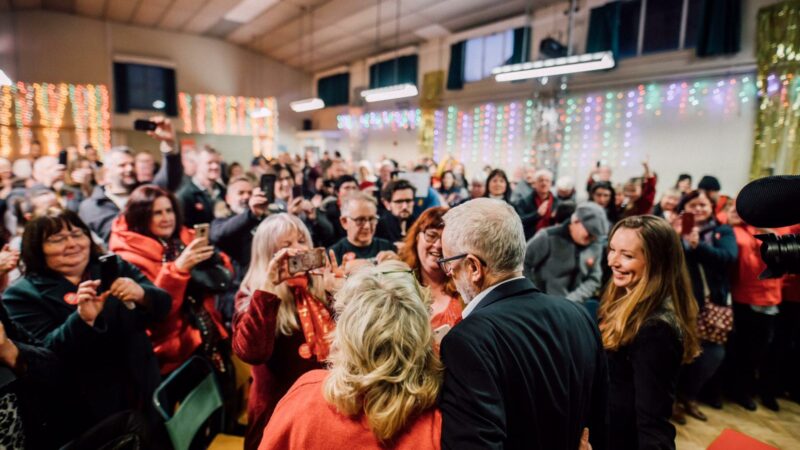
The greatest frustration is not just that we have lost. You could tell that was likely from the doorsteps, even as the polls suggested we might be gaining ground. Nor is it even the real pain, anger and horror that Britain’s most vulnerable now look set to suffer.
What upsets me most is that we could and should have won. For all the issues we have struggled with during the election – Brexit, relentless attacks on the leadership including from within the party, the perception we were offering an unfunded ‘free everything’ manifesto – there remains real desperation and enthusiasm for the change that the party could bring.
We managed to build a solid case for compassion, but fell short when it came to perceived competence and realism – as well as listening to those who we want to vote for us. During the election we risked looking self-absorbed, and as the leadership campaign gets underway that may get even worse.
You only have to look at the hordes of passionate activists and even longer lines of young voters at metropolitan polling stations to realise that we have been tapping into something powerful. But the results make clear that there are far too many places that this approach alone simply does not reach.
This isn’t a factional point. I’m a fan of both the New Statesman and Novara Media crowds, but the truth is our target voters are not reading either. In the North, Midlands, and southern constituencies that we should win like Thurrock, people want radical, realistic improvements to health, housing and education and a Labour Party to vote for that has done the heavy thinking and policy work on all of the above.
All that can and should be wrapped into a green new deal that fixes not just our environmental problems but is part of a wider global vision on issues such as tax evasion, poverty reduction and disaster preparedness. There’s an electoral coalition of voters for that – Greens flocked to us in many constituencies this election, and we will need to keep them even as we re-engage with our damaged traditional voter base.
This also wasn’t just about Brexit. And even in so far as it was, it will be much less so next time. Anyone who has been out canvassing will tell you that Jeremy Corbyn’s reputation had become a problem on the doorstep, but if we are to move forward we must realise this is about much more. That means a new, gutsy leader who can unify the party and resonates in the places we lost so badly. And they cannot be a polarising figure.
While the party pulled itself together remarkably well during the campaign itself, our movement has an even more ingrained problem of wasting energy on catastrophic infighting that predates Jeremy’s 2015 leadership victory by decades. This is a party that tore itself apart between fans of Blair and Brown, even over a choice of Milibands.
Perhaps even more seriously, we must tackle inbuilt and hugely problematic traditions of internal bullying and prejudice that run back not just through the current antisemitism crisis but through New Labour, Militant and beyond. This pushes good people of all ideological shades away from our movement. All factions remain far too intent on stitching up selections in their own interests, often blocking the kind of democratic accountability – and new talent – we badly need to thrive.
The party has ingrained problems with racism, against Jewish, black and other minority members. And factions have simultaneously weaponised such accusations, worsening the problem.
I feel that Angela Rayner remains, in many respects, best placed as a leader who could unify the party, although she could also be hugely grounding as a deputy backing up whoever wins. Keir Starmer’s raw competence, frontbench support to Corbyn and commitment to human rights and Labour values remains a potent mix. For all the criticism of Emily Thornberry for posting images of flags, she would play better in those constituencies than the current leader. So, of course, would Rebecca Long-Bailey – particularly in the North.
Any leader too easily dubbed Corbyn 2.0 will struggle, but we must not sacrifice the energy and drive for social justice. The more radical our promises, the more unquestionably they need to be anchored in realism. Arguably, we were promising too much in one go. “I hope you have the money to pay for all of this,” was a line I had more than once from voters both inside and outside of the M25.
These are arguments that we can win – as US President Franklin Delano Roosevelt did with the original 1930s ‘new deal’, relentlessly pushing that the investment was the best way out of poverty. Much of the thinking to do that is already there , often from groups like the New Economics Foundation. But it didn’t feel like we communicated that.
This isn’t a new problem for the Labour Party. While huge thought had gone into the welfare state promised in the 1945 manifesto, others have shown that rather less. Our 2015 offer almost completely ignored the housing crisis, and had an immigration policy best described as ‘written on a mug’. We now have time to do that heavy thinking, and it must not go to waste.
We can fix this – and there is an electorate out there who will vote for us if we do. But real people will suffer and die on the streets, in overcrowded hospitals and elsewhere this winter because we did not get this right. We owe it to them to not make the same mistakes again.




More from LabourList
‘Council Tax shouldn’t punish those who have the least or those we owe the most’
Two-thirds of Labour members say government has made too many policy U-turns, poll reveals
‘Two states, one future: five steps on the path to peace for Israelis and Palestinians’